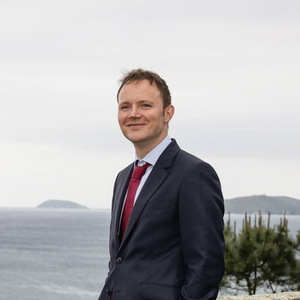
Thibaud Lebouvier
- UFR DES SCIENCES DE SANTE ET DU SPORT
- FACULTE DE MEDECINE
Home
I like to define myself as a cognitive neurologist. Naturally, I am a Doctor of Medicine – the recent Covid-19 pandemic came as a useful reminder that any physician can retrieve general medicine skills. As a matter of course, I have a specialization in Neurology, which allows me to practise emergency neurology during on-call shifts and take a broad view of the neurological patients. Certainly, I also have a PhD in Biology; I earnt skills in cell biology and animal models, and the most creative years of my career were spent in research laboratories. Yet cognitive and behavioural neurology engulfed my other identities.
While legitimate criticism is raised against hyper-specialisation in medicine and science, cognitive and behavioural neurology is interdisciplinary by essence. Like other branches of neurology, our discipline requires a strong knowledge in neuroimaging, neuroanatomy, neurobiology and neuropharmacology. Probably more than in other subspecialties, a cognitive neurologist has to be intimate with neuropathology, which is the basis of the nosology of neurocognitive disorders. More importantly however, our discipline involves and requires others, such as neuropsychology, old-age psychiatry and geriatrics. Hence, specialising in cognitive and behavioural neurology cannot be seen as gaining a technical expertise in a restricted domain. It rather guarantees openness to disciplines that transcend neurology.
Cognitive and behavioural neurology is still in its infancy. It has been only a little more than one century since Alzheimer’s disease (AD) was defined1, and 50 years since it was proven to be the dominant cause of senile dementia2. The major molecular players of degenerative dementias were discovered in the last 36 years3–6. During my own medical education and early professional career, I have witnessed the discovery of TDP-43 protein as the main component of inclusions in most cases of frontotemporal lobar degeneration (FTLD)6; I have seen the advent of cerebrospinal fluid biomarkers (CSF)7 and amyloid and tau positron-emission tomography (PET)8,9; I have already used three or four sets of new diagnostic criteria for AD10–17 and three sets of diagnostic criteria for Lewy body disorders18–20, and learnt new sets of criteria for frontotemporal dementia and primary progressive aphasias21,22; I have lived through the revolution of the genetics of FTLD23. Meanwhile, other branches of neurology, like stroke or multiple sclerosis, have seen the advent of new treatments that drastically changed the practices. However, no other branch and probably few medical specialties evolved that much in their essence, i.e. in pathophysiology and nosology, in such a little time.
Overall, cognitive and behavioural neurology is an everchanging discipline; to embrace the principles of neuropsychology and psychiatry needed to diagnose neurocognitive disorders, and to keep up to date with the progress requires the kind of commitment that may shape one’s identity. Nevertheless, reducing a professional identity to an investment in efforts and time would be short-sighted.
Indeed, I would not have chosen this path without passion. My interest for neurodegenerative disorders stemmed from the laboratories. Two consecutive experiences determined my future career: I was first introduced to tau protein and its phosphorylation during my master, under the supervision of Prof. Pascal Derkinderen; this year of cell and neuronal cultures, biochemistry and extensive readings broadened my horizons24,25. Then an internship in the neuropathology department of La Salpêtrière hospital, lead by Prof. Jean-Jacques Hauw and Charles Duyckaerts confirmed my orientation26,27.
I acknowledge that my interest for the diagnosis and care of neurocognitive disorders came second. However, I have always been a clinician. Although I am still humbled by neuropsychology, a discipline that I will continue focusing my efforts on, I believe I have a quality that is essential to a cognitive neurologist: an insatiable detective’s curiosity for patient’s histories, a relentless inquisitiveness to understand the changes they have experienced in behaviour and function. I have always found staggering to make connexions between complex patient’s histories and brain network dysfunctions, and then between brain dysfunction and protein aggregates. Through years of clinical practice, I learnt that this lengthy and complex diagnostic process often results in better care, although I keep questioning the balance between workup thoroughness and patient/caregiver benefits in the absence of disease-modifying treatment. But I trust – know, even – that diagnostic accuracy will become central for the treatment of neurocognitive disorders in the upcoming years. To me, this is the fundament of my identification as a cognitive neurologist.



